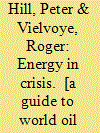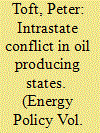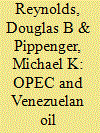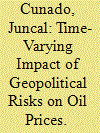|
|
|
Sort Order |
|
|
|
Items / Page
|
|
|
|
|
|
|
| Srl | Item |
| 1 |
ID:
087098


|
|
|
|
|
| Publication |
London, Rogert Yeatman Limited, 1974.
|
| Description |
223p.
|
|
|
|
|
|
|
|
|
|
|
|
Copies: C:1/I:0,R:0,Q:0
Circulation
| Accession# | Call# | Current Location | Status | Policy | Location |
| 014063 | 333.79/HIL 014063 | Main | On Shelf | General | |
|
|
|
|
| 2 |
ID:
110419


|
|
|
|
|
| Publication |
2011.
|
| Summary/Abstract |
In this paper I investigate how often and how much outbreaks of intrastate conflict in oil producing states translates into oil supply shortfalls. The Libyan conflict that broke out in February 2011 highlighted the fear that intrastate conflict in oil producing states may imply shortfalls and ensuing volatile global oil prices. I argue, however, that it is far from certain that shortfalls following conflict outbreak will occur, since both sides in a conflict face incentives simultaneously to protect and maintain oil installations and to strike and destroy these. Based on a quantitative analysis of 39 intrastate wars in oil producing countries (1965-2007) I conclude that outbreak of conflict does not translate into production decline with any certainty. In fact, likelihoods are less than 50% for reductions to occur. In many cases growing production actually followed conflict outbreak. I conclude by investigating four characteristics of intrastate conflict that may explain when oil production is at risk during conflict: (1) proximity of oil producing fields to key battle zones, (2) duration of conflict, (3) separatism and the location of oil in separatist territory, and (4) the relative size of oil production. While the first three factors did not prove important, oil producer size could be significant. But further research is needed to establish this with greater certainty.
|
|
|
|
|
|
|
|
|
|
|
|
|
|
|
|
| 3 |
ID:
098678


|
|
|
|
|
| Publication |
2010.
|
| Summary/Abstract |
This study revisits the OPEC cartel hypothesis using a case study. A test is conducted to see if Venezuela has its production Granger cause its OPEC quota or whether the OPEC quota for Venezuela Granger causes Venezuelan production. The results show both occur at different times. In the short run, OPEC's oil production quota for Venezuela Granger causes Venezuelan production. However, shortly after cuts, Venezuela cheats on agreements, suggesting a tit-for-tat oligopoly game, which is not anti-competitive. In the long run, we show that Venezuelan oil production Granger causes OPEC's quota for Venezuela, but not vice versa. Having Venezuelan oil production Granger cause OPEC quotas for Venezuela in the long run suggests OPEC does not coordinate outputs as much as it reacts to them. The evidence suggests Venezuela is not a part of an OPEC anti-competitive syndicate even though we show that Venezuelan oil production is low. An alternative explanation for why Venezuela and possibly other OPEC members have low oil production outputs is that institutions and risk aversion, not cartel participation, is the cause. A vector error correction model shows that there is no tendency for Venezuelan oil production to converge to OPEC's quota for Venezuela.
|
|
|
|
|
|
|
|
|
|
|
|
|
|
|
|
| 4 |
ID:
089753


|
|
|
|
|
| Publication |
2009.
|
| Summary/Abstract |
Beijing is pursuing a two-pronged strategy to secure its energy, using the navy to protect maritime supply and building new pipelines. Article examines whether this approach will be sufficient for its expected future increase in demand for oil.
|
|
|
|
|
|
|
|
|
|
|
|
|
|
|
|
| 5 |
ID:
174615


|
|
|
|
|
| Summary/Abstract |
This paper analyses the dynamic impact of geopolitical risks (GPRs) on real oil returns for the period February 1974 to August 2017, using a time-varying parameter structural vector autoregressive (TVP-SVAR) model. Besides the two variables of concern, the model also includes growth in world oil production, global economic activity (to capture oil-demand), and world stock returns. We show that GPRs (based on a tally of newspaper articles covering geopolitical tensions), in general, has a significant negative impact on oil returns, primarily due to the decline in oil demand captured by the global economic activity. Our results, thus, highlight the risk of associating all GPRs with oil supply shocks driven by geopolitical tensions in the Middle East, and hence, ending up suggesting that higher GPRs drive up oil prices.
|
|
|
|
|
|
|
|
|
|
|
|
|
|
|
|
|
|
|
|
|